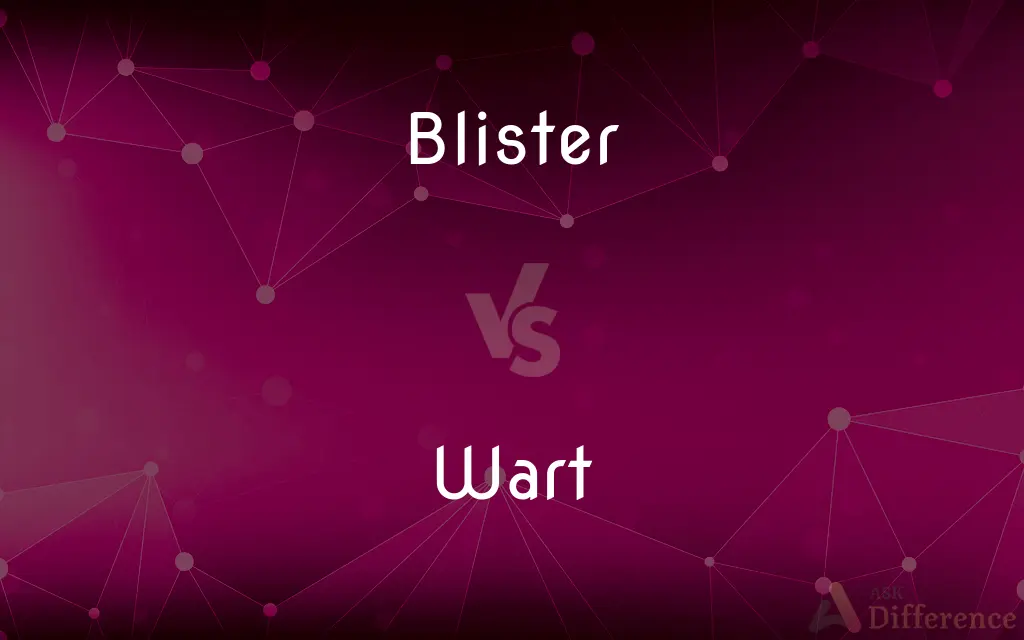Blister vs. Wart — What's the Difference?
By Tayyaba Rehman — Updated on September 25, 2023
A blister is a small bubble on the skin filled with serum, while a wart is a small, hard, benign growth caused by a viral infection.

Difference Between Blister and Wart
Table of Contents
ADVERTISEMENT
Key Differences
Blister and wart, though both skin conditions, have distinct characteristics and causes. A blister is typically a response to an injury or irritation, forming a protective layer over damaged skin. Blisters often arise from friction, burns, or certain skin diseases. The primary purpose of a blister is to protect and cushion the layers underneath, allowing for healing. Conversely, a wart is a small growth on the skin caused by the human papillomavirus (HPV). Unlike the temporary nature of blisters, warts can persist for longer periods, sometimes years.
While blisters are filled with a clear fluid known as serum, warts are solid, raised, and often rough to touch. Blisters can form anywhere on the body, commonly on the feet or hands due to repetitive friction or rubbing. Warts, on the other hand, can also appear anywhere but are prevalent on the hands, feet, and face.
The treatment approach for both conditions varies significantly. Blisters usually heal on their own without requiring medical intervention. It's often recommended to leave them intact to prevent infection. Warts, however, might require treatments like freezing, topical creams, or minor surgical procedures.
Ultimately, while blisters and warts are both skin anomalies, their differences in origin, appearance, duration, and treatment set them apart distinctly.
Comparison Chart
Cause
Friction, burns, skin diseases
Human papillomavirus (HPV)
ADVERTISEMENT
Appearance
Fluid-filled bubble
Hard, rough growth
Duration
Temporary, often short-lived
Can persist for months to years
Treatment
Usually heals on its own
May require medical treatments
Common Locations
Hands, feet (due to friction)
Hands, feet, face
Compare with Definitions
Blister
A protective formation on the skin due to irritation.
New shoes often cause blisters if not worn in.
Wart
A small, hard growth on the skin due to viral infection.
He had a wart removed from his finger last year.
Blister
A raised area of skin containing clear serum.
The burn caused a painful blister on her arm.
Wart
A rough-textured skin lesion caused by HPV.
She felt self-conscious about the wart on her hand.
Blister
A vesicle on the skin.
The intense sun can sometimes cause blisters.
Wart
A benign skin tumor.
It's just a wart, not a mole, so it's less concerning.
Blister
A blister is a small pocket of body fluid (lymph, serum, plasma, blood, or pus) within the upper layers of the skin, usually caused by forceful rubbing (friction), burning, freezing, chemical exposure or infection. Most blisters are filled with a clear fluid, either serum or plasma.
Wart
A persistent skin growth.
The wart on her toe has been there for years.
Blister
A local swelling of the skin that contains watery fluid and is caused by burning or irritation.
Wart
A raised imperfection on the skin surface.
Kids often get warts on their knees and elbows.
Blister
A similar swelling on a plant.
Wart
Warts are typically small, rough, hard growths that are similar in color to the rest of the skin. They typically do not result in other symptoms, except when on the bottom of the feet, where they may be painful.
Blister
A raised bubble, as on a painted or laminated surface.
Wart
A hard rough lump growing on the skin, caused by infection with certain viruses and occurring typically on the hands or feet.
Blister
A rounded, bulging, usually transparent structure, such as one used for observation on certain aircraft or for display and protection of packaged products.
Wart
A similar growth or protuberance, as on a plant.
Blister
To cause a blister to form on.
Wart
A genital wart.
Blister
To reprove harshly.
Wart
One that resembles or is likened to a wart, especially in unattractiveness or smallness.
Blister
To break out in or as if in blisters.
Wart
An imperfection; a flaw.
Blister
A swelling on a plant.
Wart
(pathology) A type of deformed growth occurring on the skin caused by the human papillomavirus (HPV).
Blister
(medicine) Something applied to the skin to raise a blister; a vesicatory or other applied medicine.
Wart
Any similar growth occurring in plants or animals, such as the parotoid glands in the back of toads.
Blister
A bubble, as on a painted surface.
Wart
Any of the prefixes used in Hungarian notation.
Blister
(roofing) An enclosed pocket of air, which may be mixed with water or solvent vapor, trapped between impermeable layers of felt or between the membrane and substrate.
Wart
A small, usually hard, tumor on the skin formed by enlargement of its vascular papillæ, and thickening of the epidermis which covers them.
Blister
A type of pre-formed packaging made from plastic that contains cavities.
Blister card
Blister pack
Wart
An excrescence or protuberance more or less resembling a true wart; specifically (Bot.), a glandular excrescence or hardened protuberance on plants.
Blister
A cause of annoyance.
Wart
Any small rounded protuberance (as on certain plants or animals)
Blister
(uncountable) A form of smelted copper with a blistered surface.
Wart
(pathology) a firm abnormal elevated blemish on the skin; caused by a virus
Blister
(transitive) To raise blisters on.
A chemical agent that blisters the skin
Blister
To sear after blaching.
Blister
(intransitive) To have a blister form.
Blister
(transitive) To criticise severely.
Blister
(intransitive) To break out in blisters.
Blister
A vesicle of the skin, containing watery matter or serum, whether occasioned by a burn or other injury, or by a vesicatory; a collection of serous fluid causing a bladderlike elevation of the cuticle.
And painful blisters swelled my tender hands.
Blister
Any elevation made by the separation of the film or skin, as on plants; or by the swelling of the substance at the surface, as on steel.
Blister
A vesicatory; a plaster of Spanish flies, or other matter, applied to raise a blister.
Blister
To be affected with a blister or blisters; to have a blister form on.
Let my tongue blister.
Blister
To raise a blister or blisters upon.
My hands were blistered.
Blister
To give pain to, or to injure, as if by a blister.
This tyrant, whose sole name blisters our tongue.
Blister
(pathology) an elevation of the skin filled with serous fluid
Blister
Get blistered;
Her feet blistered during the long hike
Blister
Subject to harsh criticism;
The Senator blistered the administration in his speech on Friday
The professor scaled the students
Your invectives scorched the community
Blister
Cause blisters to from on;
The tight shoes and perspiration blistered her feet
Blister
A small bubble on the skin filled with fluid.
He got a blister on his heel after a long hike.
Blister
A result of skin damage from friction or heat.
He should have worn gloves to avoid those blisters.
Common Curiosities
Can both blisters and warts be contagious?
While blisters usually aren't, warts can be contagious through direct skin-to-skin contact.
How can I prevent getting blisters?
Wearing well-fitted shoes, using protective gloves, and reducing skin friction can help prevent blisters.
Is it safe to pop a blister?
It's recommended to leave blisters intact to avoid infection. If necessary, it should be done sterilized and carefully.
Can warts spread on the same person?
Yes, scratching or picking a wart can spread the virus to other parts of the body.
Are all warts caused by HPV?
Yes, warts are growths on the skin caused by various strains of the human papillomavirus (HPV).
How are warts treated?
Treatments include freezing, salicylic acid, laser therapy, and minor surgical removal.
Should I cover a blister?
Covering a blister can protect it from further friction and potential infection.
How long does a blister usually last?
Blisters typically heal in a few days to two weeks, depending on the cause and care.
Can warts reappear after removal?
Yes, it's possible for warts to return at the same spot or elsewhere, even after treatment.
Are warts cancerous?
While most warts are benign, some strains of HPV associated with warts can lead to cancers, especially in the genital region.
Are warts and moles the same?
No, while both are skin growths, warts are caused by viruses, whereas moles are skin pigment cells.
Can blisters be caused by diseases?
Yes, some diseases like chickenpox, herpes, and hand-foot-mouth disease can cause blisters.
Are warts a sign of a weak immune system?
While anyone can get warts, they're more common in those with weakened immune systems.
Do shoes cause blisters?
Ill-fitting shoes or new shoes not yet broken in can cause friction leading to blisters.
Share Your Discovery

Previous Comparison
Torque vs. Couple
Next Comparison
Insulin vs. GlucagonAuthor Spotlight
Written by
Tayyaba RehmanTayyaba Rehman is a distinguished writer, currently serving as a primary contributor to askdifference.com. As a researcher in semantics and etymology, Tayyaba's passion for the complexity of languages and their distinctions has found a perfect home on the platform. Tayyaba delves into the intricacies of language, distinguishing between commonly confused words and phrases, thereby providing clarity for readers worldwide.














































